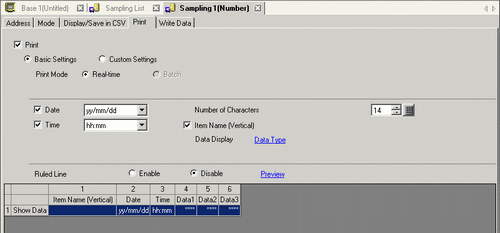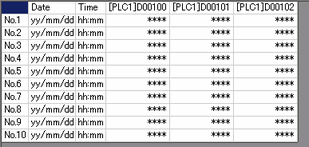Set the format for printing sampling data from a printer connected to the display unit.
The following explains the [Basic Settings]. Refer to the following for Custom Settings.
![]() 25.9.7 Print (Custom Settings)
25.9.7 Print (Custom Settings)
![]()
If you display a sampling group with [Enable multiple data types] selected in the [Address] tab, bit data is printed as "ON" or "OFF". Text data is printed according to the [Language] specified in the [Sampling List].

Select whether or not to print. When printing sampling data, ensure that this option is checked, and select the print format.
Basic Settings/Custom Settings
Select the print format setting mode.
Basic Settings
Use a preset format to easily configure settings.
Custom Settings
Set a customized format.
Print Mode
Select the print timing.
Real-time Print
Printing is performed every time sampling occurs.
Batch
Data is printed in block units. This can only be set when in the [Mode] tab's Extended area the [Overwrite old data after finishing the specified cycles] check box is cleared.
Printing is started via the [Print Control Word Address].
![]()
Print Control Word Address
When the [Print Mode] is set to [Batch], select an address to control the start of printing. When 0 bit of the designated address turns ON the printing starts.
Two sequential Words are used to store the Word Address: the control Word and the block number. Select the block number and start the printing.

Print Completion Bit Address
When the [Print Mode] is set to [Batch], select an address to confirm the completion of the printing.
Designates the Bit Address to be turned ON when data is printed out for each block. After confirming that this Bit Address is turned ON, perform the next printing.
Date
Defines whether or not to print the date, as: [yy/mm/dd], [mm/dd/yy], [dd/mm/yy], or [mm/dd]. "yy" prints the last two digits of the year, and "mm" and "dd" use two digits to print the month and date."yy" displays the last two digits of the year, and "mm" and "dd" use two digits to display the month and date.
Time
Select the time format [hh:mm], [hh:mm:ss] or [hh:mm:ss.ms]. "hh" displays the hours, "mm" displays the minutes, and "ss" displays the seconds, all using two digits. "ms" uses three digits to display the milliseconds.
Number of Characters
If in the [Mode] tab's Extended area the [Overwrite old data after finishing the specified cycles] check box is selected, set from 10 to 100 the number of characters to display in a cell.
Item Name (Horizontal) Characters
If in the [Mode] tab's Extended area the [Overwrite old data after finishing the specified cycles] check box is cleared, designate whether or not to print the Item Name row. When printing, you can set up the block name with 10 to 100 single-byte characters.
For the Date and Time columns, the item names will be printed as [Date] and [Time]. For a Data column, the address will be printed.
Item Name (Vertical) Characters
Select whether or not the Item Name column will be printed.
Data Display
Click [Data Type Settings] to open the [Data Settings] dialog box, where you can set the data type, the source range, and the number of display digits.
![]() 25.9.6.1 Print/Data Settings - Data Type
25.9.6.1 Print/Data Settings - Data Type
Total
If in the [Mode] tab's Extended area the [Overwrite old data after finishing the specified cycles] check box is cleared, designate whether or not to print the Total row. Click on [Data Type Settings] and open the [Calculation Settings] dialog box. The number of display digits for the Totals rows can now be set.
![]() 25.9.6.3 Print/Calculation Settings - Data Type
25.9.6.3 Print/Calculation Settings - Data Type
Ruled Line
Select whether or not the ruled line will be printed.
Preview
Opens a preview screen to confirm the print image.
Preview area
Displays the set contents with the selected print format.
If in the [Mode] tab's Extended area the [Overwrite old data after finishing the specified cycles] check box is selected, only one data row will be displayed. If the [Overwrite old data after finishing the specified cycles] check box is cleared, the data rows equal the designated [Occurrences].
When [Overwrite old data after finishing the specified cycles] check box is selected
![]()
When [Overwrite old data after finishing the specified cycles] check box is cleared
